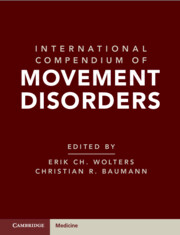Book contents
- International Compendium of Movement Disorders
- International Compendium of Movement Disorders
- Copyright page
- Contents
- Contributors
- International Compendium of Movement Disorders
- Hypo- and Hyperkinetic, Dyscoordinative and Otherwise Inappropriate Motor and Behavioral Movement Disorders
- Section 1: Basic Introduction
- Section 2: Hypokinetic Movement Disorders
- Section 3: Hyperkinetic Movement Disorders
- Section 4: Dyscoordinative and Otherwise Inappropriate Motor Behaviors
- Chapter 46 Ataxia
- Chapter 47 Treatable Hereditary Cerebellar Ataxias
- Chapter 48 Gait and Balance Disorders
- Chapter 49 Episodic/Paroxysmal Movement Disorders
- Chapter 50 Sleep-Related Movement Disorders and Disturbances of Motor Control
- Chapter 51 Drug-Induced Movement Disorders
- Chapter 52 Psychiatric Movement Disorders
- Chapter 53 Functional Movement Disorders
- Section 5: Objectifying Movement Disorders
- Movement Disorders in Vivo: Video Fragments
- Acronyms and Abbreviations
- Index
- References
Chapter 48 - Gait and Balance Disorders
from Section 4: - Dyscoordinative and Otherwise Inappropriate Motor Behaviors
Published online by Cambridge University Press: 07 January 2025
- International Compendium of Movement Disorders
- International Compendium of Movement Disorders
- Copyright page
- Contents
- Contributors
- International Compendium of Movement Disorders
- Hypo- and Hyperkinetic, Dyscoordinative and Otherwise Inappropriate Motor and Behavioral Movement Disorders
- Section 1: Basic Introduction
- Section 2: Hypokinetic Movement Disorders
- Section 3: Hyperkinetic Movement Disorders
- Section 4: Dyscoordinative and Otherwise Inappropriate Motor Behaviors
- Chapter 46 Ataxia
- Chapter 47 Treatable Hereditary Cerebellar Ataxias
- Chapter 48 Gait and Balance Disorders
- Chapter 49 Episodic/Paroxysmal Movement Disorders
- Chapter 50 Sleep-Related Movement Disorders and Disturbances of Motor Control
- Chapter 51 Drug-Induced Movement Disorders
- Chapter 52 Psychiatric Movement Disorders
- Chapter 53 Functional Movement Disorders
- Section 5: Objectifying Movement Disorders
- Movement Disorders in Vivo: Video Fragments
- Acronyms and Abbreviations
- Index
- References
Summary
Gait and balance are fundamental human abilities. When assessing a patient, a certain phenomenologic gait pattern is identified based on characteristic signs that we relate to anatomic systems (topo-diagnosis). According to their functional complexity, these systems can be categorized into lower-level systems (bones, muscles, nerves); intermediate-level systems (basal ganglia, cerebellum, sensory systems); and higher-level systems (cortex–basal ganglia loops). In a second step, we relate this to an underlying etiology, giving rise to a two-axis diagnosis. Gait examination can show direct stepping disturbances as well as indirect, i.e., compensatory changes mainly related to dysbalance (e.g., broad-based gait). The most common disorders include the “ataxias,” related to disturbances of the cerebellum or the sensory systems; basal ganglia gait disorders with parkinsonian or hyperkinetic phenomenology; and higher-level gait disorders, related to disturbances within the cortex–basal ganglia loops, which lead to inappropriate selection and organization of gait and balance programs, resulting in impaired stepping (with freezing of gait) and balance.
Keywords
- Type
- Chapter
- Information
- International Compendium of Movement Disorders , pp. 600 - 616Publisher: Cambridge University PressPrint publication year: 2025

